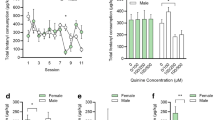Abstract
Rats were taught an aversion to a sucrose taste cue (CS) by pairing it with lithium chlorideinduced toxicosis (UCS). The CS-UCS interval was 30 min. Animals were injected with pentylenetetrazol (PTZ) (50 mg/kg) at 0, 15, 25, 28 or 30 min after the CS in an attempt to disrupt taste aversion learning. Only animals given PTZ 30 min after the CS (simultaneously with the UCS) showed a significant learning deficit. However, learning deficits were also observed in individual animals in groups given PTZ at 15, 25 and 28 min. As lithium salts may produce seizures and abnormal electroencephalographic activity, it is suggested that the neurophysiological consequences of PTZ administration may interact with those of LiCl, causing a greater amnesic effect than PTZ by itself. The resulting interference with the memory trace is probably affecting either the neural engram underlying the CS or the associative bond between the CS and UCS. Evidence was also found that PTZ could act as a UCS with which to establish a mild taste aversion.
Similar content being viewed by others
References
Ahlers, R. H., Best, P. J.: Retrograde amnesia for discriminated taste aversions: A memory deficit. J. Comp. Physiol. Psychol. 79, 371–376 (1972)
Buresova, O., Bures, J.: Cortical and subcortical components of the conditioned saccharin aversion. Physiol. Behav. 11, 435–439 (1973)
Edwards, A. L.: Experimental design in psychological research. New York: Holt, Rinehart and Winston 1968
Garcia, J., Hankins, W. G., Rusiniak, K. W.: Behavioral regulation of the milieu interne in man and rat. Science 185, 824–831 (1974)
Goodman, L. S., Gilman, A.: The pharmacological basis of therapeutics. New York: Macmillan 1975
Kral, P. A.: Interpolation of ECS during CS-UCS interval as an impediment to the conditioning of taste aversion. Psychon. Sci. 19, 36–37 (1970)
Kral, P. A.: ECS during taste-illness interval: Evidence for induced dissociation. Physiol. Behav. 7, 667–670 (1971a)
Kral, P. A.: ECS between tasting and illness: Effects of current parameters on a taste aversion. Physiol. Behav. 7, 779–782 (1971b)
Millner, J. R., Palfai, T.: Metrazol impairs conditioned aversion produced by LiCl: A time dependent effect. Pharmacol. Biochem. Behav. 3, 201–204 (1975)
Nachman, M.: Limited effects of electroconvulsive shock on memory of taste stimulation. J. Comp. Physiol. Psychol. 73, 31–37 (1970)
Neki, J. S., Kishore, B.: Narcostimulation in depressive states. Am. J. Psychiatry 124, 1196–1201 (1968)
Shopsin, B., Johnson, G., Gershon, S.: Neurotoxicity with lithium: Differential drug responsiveness. Int. Pharmacopsychiatry 5, 170–182 (1970)
Author information
Authors and Affiliations
Rights and permissions
About this article
Cite this article
Shaw, N., Webster, D.M. Disruption of taste aversion learning by pentylenetetrazol. Psychopharmacology 66, 195–198 (1979). https://doi.org/10.1007/BF00427630
Received:
Issue Date:
DOI: https://doi.org/10.1007/BF00427630




